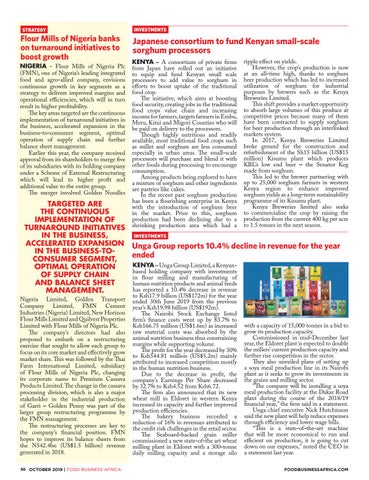STRATEGY
Flour Mills of Nigeria banks on turnaround initiatives to boost growth NIGERIA - Flour Mills of Nigeria Plc (FMN), one of Nigeria’s leading integrated food and agro-allied company, envisions continuous growth in key segments as a strategy to delivere improved margins and operational efficiencies, which will in turn result in higher profitability. The key areas targeted are the continuous implementation of turnaround initiatives in the business, accelerated expansion in the business-to-consumer segment, optimal operation of supply chain and further balance sheet management. Earlier this year, the company received approval from its shareholders to merge five of its subsidiaries with its holding company under a Scheme of External Restructuring which will lead to higher profit and additional value to the entire group. The merger involved Golden Noodles
INVESTMENTS
Japanese consortium to fund Kenyan small-scale sorghum processors KENYA – A consortium of private firms from Japan have rolled out an initiative to equip and fund Kenyan small scale processors to add value to sorghum in efforts to boost uptake of the traditional food crop. The initiative, which aims at boosting food security, creating jobs in the traditional food crops value chain and increasing income for farmers, targets farmers in Embu, Meru, Kitui and Migori Counties who will be paid on delivery to the processors. Though highly nutritious and readily available, most traditional food crops such as millet and sorghum are less consumed especially in urban areas. The small-scale processors will purchase and blend it with other foods during processing to encourage consumption. Among products being explored to have a mixture of sorghum and other ingredients are pastries like cakes. In the recent past sorghum production has been a flourishing enterprise in Kenya with the introduction of sorghum beer in the market. Prior to this, sorghum production had been declining due to a shrinking production area which had a
ripple effect on yields. However, the crop’s production is now at an all-time high, thanks to sorghum beer production which has led to increased utilization of sorghum for industrial purposes by brewers such as the Kenya Breweries Limited. This shift provides a market opportunity to absorb large volumes of this produce at competitive prices because many of them have been contracted to supply sorghum for beer production through an interlinked markets system. In 2017, Kenya Breweries Limited broke ground for the construction and refurbishment of the Sh15 billion (US$15 million) Kisumu plant which produces KBL’s low end beer – the Senator Keg made from sorghum. This led to the brewer partnering with up to 25,000 sorghum farmers in western Kenya region to enhance improved sorghum yields as a long-term sustainability programme of its Kisumu plant. Kenya Breweries limited also seeks to commercialize the crop by raising the production from the current 400 kg per acre to 1.5 tonnes in the next season.
to Ksh17.9 billion (US$172m) for the year ended 30th June 2019 from the previous year’s Ksh19.98 billion (US$192m). The Nairobi Stock Exchange listed firm’s finance costs went up by 83.7% to Ksh166.75 million (US$1.6m) as increased raw material costs was absorbed by the animal nutrition business thus constraining margins while supporting volume. The profit for the year decreased by 30% to Ksh544.81 million (US$5.2m) mainly attributed to increased competition mostly in the human nutrition business. Due to the decrease in profit, the company’s Earnings Per Share decreased by 32.7% to Ksh4.52 from Ksh6.72. The firm also announced that its new wheat mill in Eldoret in western Kenya increased its capacity and further improved production efficiencies. The bakery business recorded a reduction of 16% in revenues attributed to the credit risk challenges in the retail sector. The Seaboard-backed grain miller commissioned a new state-of-the art wheat milling plant in Eldoret with a 300-tonne daily milling capacity and a storage silo
with a capacity of 15,000 tonnes in a bid to grow its production capacity. Commissioned in mid-December last year, the Eldoret plant is expected to double the millers’ current production capacity and further rise competition in the sector. They also unveiled plans of setting up a soya meal production line in its Nairobi plant as it seeks to grow its investments in the grains and milling sector. ‘’The company will be installing a soya meal production facility at the Dakar Road plant during the course of the 2018/19 financial year,” the firm said in a statement. Unga chief executive Nick Hutchinson said the new plant will help reduce expenses through efficiency and lower wage bills. “This is a state-of-the-art machine that will be more economical to run and efficient on production, it is going to cut down on our expenses,” noted the CEO in a statement last year.
TARGETED ARE THE CONTINUOUS IMPLEMENTATION OF TURNAROUND INITIATIVES INVESTMENTS IN THE BUSINESS, ACCELERATED EXPANSION Unga Group reports 10.4% decline in revenue for the year IN THE BUSINESS-TOended CONSUMER SEGMENT, KENYA – Unga Group Limited, a KenyanOPTIMAL OPERATION based holding company with investments OF SUPPLY CHAIN in flour milling and manufacturing of AND BALANCE SHEET human nutrition products and animal feeds has reported a 10.4% decrease in revenue MANAGEMENT.
Nigeria Limited, Golden Transport Company Limited, FMN Cement Industries (Nigeria) Limited, New Horizon Flour Mills Limited and Quilvest Properties Limited with Flour Mills of Nigeria Plc. The company’s directors had also proposed to embark on a restructuring exercise that sought to allow each group to focus on its core market and effectively grow market share. This was followed by the Thai Farm International Limited, subsidiary of Flour Mills of Nigeria Plc, changing its corporate name to Premium Cassava Products Limited. The change in the cassava processing division, which is also a major stakeholder in the industrial production of Garri – Golden Penny was part of the larger group restructuring programme by the FMN management. The restructuring processes are key to the company’s financial position. FMN hopes to improve its balance sheets from the N542.4bn (US$1.5 billion) revenue generated in 2018. 50 OCTOBER 2019 | FOOD BUSINESS AFRICA
FOODBUSINESSAFRICA.COM
